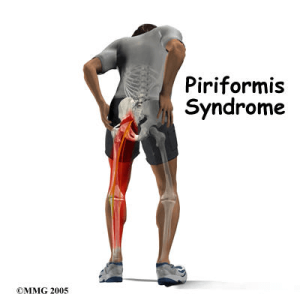Physiotherapy North York – P&C Rehab Services for Rehabilitation
Piriformis Syndrome
 Piriformis is a small butt muscle that contributes to external rotation of hip. It enables us to walk, shift weight from one foot to another and maintain balance. Piriformis Syndrome occurs when this muscle compresses the sciatic nerve (the nerve that originates from spine and passes through the buttocks and down the back of thighs and legs). Piriformis Syndrome is also known as pseudo sciatica, wallet sciatica or hip socket neuropathy.
Piriformis is a small butt muscle that contributes to external rotation of hip. It enables us to walk, shift weight from one foot to another and maintain balance. Piriformis Syndrome occurs when this muscle compresses the sciatic nerve (the nerve that originates from spine and passes through the buttocks and down the back of thighs and legs). Piriformis Syndrome is also known as pseudo sciatica, wallet sciatica or hip socket neuropathy.
Causes
- Piriformis muscle either irritates or compress the proximal part of sciatic nerve due to spasm or contracture.
- Fibrosis due to trauma.
- Prolong sitting .
- Keeping wallet/cellphone in the rear pocket of jeans.
- Vigorous physical activity.
- Total hip arthroplasty.
- Myositis ossificans.
- Leg length discrepancy.
- Bleeding or hematoma near piriformis muscle.
Symptoms
- A dull ache in buttocks .
- Pain down the back of thigh, leg and foot .
- Tingling and numbness in leg and foot .
- Pain on walking uphill or climbing stairs.
- Increased pain on prolong sitting .
- Reduced range of motion of hip .
- Pain worsens on prolong walking and running and one feels better lying down on the back.
Diagnosis
Diagnosis is based on patient’s medical history and physical examination. In physical examination, attempt is made to stretch an irritated piriformis muscle and provoke sciatic nerve compression. FABER (Flexion, Abduction, External rotation of hip) and FAIR (Flexion, adduction, Internal rotation of hip) maneuvers are done to provoke sciatic nerve compression. Other diagnostic modalities like X ray, MRI, CT scan, Ultrasound and EMG are done to rule out other conditions.
Treatment
- Non-steroidal anti-inflammatory and muscle relaxants help in relieving pain.
- Physical Therapy- Stretching and strengthening exercises of muscles surrounding the hip joint. Hip joint mobilization, massage, myofascial release techniques, hot/ice application, TENS are therapeutic approaches to treat piriformis syndrome.
- Piriformis injection- Local injection of corticosteroid or anesthetic agent directly over piriformis muscle to reduce swelling, spasm and pain. The goal of injection is to relax the muscle and help reduce pressure on sciatic nerve.
If you are suffering from piriformis syndrome or have any questions regarding this condition don’t hesitate to contact us. All the health professionals at P&C Rehabilitation Services have experience treating this condition.
